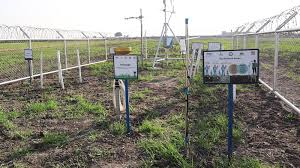Islamabad, March 1: The International Water Management Institute (IWMI) has inaugurated an Eddy Covariance Flux Tower at the Barani Agricultural Research Institute (BARI) in Chakwal, Punjab. This state-of-the-art climate monitoring system, funded by the UK government under the “Water Resource Accountability in Pakistan” (WRAP) program, is a significant step toward enhancing Pakistan’s climate resilience.
The flux tower is designed to measure key environmental parameters such as temperature, rainfall, and agricultural conditions, providing valuable data to support climate adaptation strategies. Its advanced capabilities will help improve water resource management, optimize agricultural practices, and reduce climate-related risks.
The inauguration ceremony brought together key stakeholders, including Ms. Anna Balance, Senior Climate Advisor at the UK’s Foreign, Commonwealth & Development Office (FCDO); Dr. Mohsin Hafeez, Global Director of Water, Food, and Ecosystems at IWMI; and Ms. Nimra Zaheer, Group Head at the FCDO.
Speaking at the event, Anna Balance underscored the role of innovative technology in advancing sustainable agriculture. She reaffirmed the FCDO’s commitment to knowledge-sharing and raising awareness to drive meaningful change across Pakistani communities.
Dr. Mohsin Hafeez highlighted the tower’s long-term benefits, emphasizing its role in providing reliable, real-time data for farmers, researchers, and local irrigation authorities. He noted that the system would enable farmers to receive advanced alerts and tailored recommendations on crop cultivation, potential risks, and protective measures.
The flux tower is part of a broader effort to improve Pakistan’s ability to measure and manage its water resources amid growing climate challenges. By offering precise environmental data, the initiative supports Pakistan’s transition toward more sustainable and climate-resilient agricultural practices.
This development marks another milestone in Pakistan’s collaboration with international partners to enhance climate adaptation and safeguard its agricultural sector against the increasing impacts of climate change.









